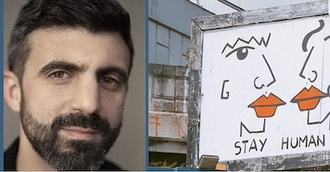'Staying Human: Useful Lives' - the meaning of the assisted suicide debate

Dan Hitchens
In a forthcoming lecture, Dan Hitchens will address the advance of assisted suicide legislation and its potential to be a historical turning-point. Examining both secular and religious controversies about suicide throughout the centuries, he will ask what it means if a national suicide service becomes an answer to Britain's social problems.
In 'Staying Human: Useful Lives', Dan Hitchens will put the arguments over the current proposal into a wider context, suggesting a deeper crisis over what it means to be human and what it means to care for each other. Drawing on the philosophical tradition from Aristotle to contemporary thinkers, and analysing the detail of parliamentary debates and shifting public attitudes, he will explore how assisted suicide treats death as a solution for questions society struggles to answer. And he will propose an alternative in the values of Cicely Saunders: the palliative care pioneer who, rooted in a Christian understanding of personhood, also represented a tradition of care, community and shared responsibility which until now has defined modern British culture.
"The assisted suicide debate has revealed a profound indifference to people in vulnerable situations," says Dan Hitchens, senior editor at First Things. "Under the terms of the bill, anyone with a six-month diagnosis could receive an assisted death simply because they were poor, homeless, depressed, isolated or afraid. Assisted suicide, introduced like this, looks less like mercy than like a gigantic abdication of responsibility."
Hitchens argues that assisted suicide is not merely a legal or medical matter but a spiritual and cultural turning point. "We may be on the brink of becoming a different kind of country," he says, "where the tradition of care - so fundamental to our Christian heritage and our secular present - gives way to a much colder and more brutal attitude to those on the margins of society."
Jenny Sinclair, Founder and Director of Together for the Common Good, praised Hitchens's contribution as a leading voice on the moral and cultural implications of assisted dying. "Dan has been one of the most insightful commentators on the passage of the End of Life Bill through Parliament and what it reveals about our society," she said. "In this event, he will go beyond the Bill to explore what this profound cultural shift means for our society, before opening up a frank discussion to enable Christians of all traditions to face the reality of this moment - and to equip us for the challenging times ahead."
This talk, the fourth in the 'Staying Human' series, seeks to respond to a growing public unease about the direction of end-of-life ethics in the UK. Recent parliamentary efforts to legalise assisted suicide, alongside media narratives framing dependence as indignity, have prompted faith communities to re-examine how society treats the most vulnerable.
Event organisers describe the evening as "an opportunity for people of faith and goodwill to reflect on what it means to stay human in an age that prizes individual choice over the common good."
Dan Hitchens is a Senior Editor at First Things magazine. As a freelance journalist, Dan has been monitoring the issue of assisted suicide closely and reflecting on this cultural moment. His writing has also appeared in The Spectator, The Times, Compact, Unherd, The Critic, the Wall Street Journal, the New York Times, and various other publications. Formerly, he edited the Catholic Herald. He holds a PhD on the 18th-century author Samuel Johnson and is the co-author of The Cambridge Introduction to Samuel Johnson (Cambridge University Press, 2025).
Event Details
Friday 21 November 6.30pm
Online talk: Staying Human: Useful Lives
Speaker: Dan Hitchens
Tickets: www.eventbrite.co.uk/e/staying-human-useful-lives-tickets-1867114974149
For more information: www.indcatholicnews.com/editarticle/53709
About the Series
The Staying Human series fosters open, reflective dialogue on the moral questions shaping contemporary society - from technology and bioethics to community and care. It is rooted in a conviction that faith still has something vital to say about what makes us truly human.
This series is made possible with the support of CCLA, the leading investment manager for mission-driven organisations in UK. This event is also supported by CARE (Christian Action Research and Education), the social policy charity. Thanks also to the Catholic Union of Great Britain for help in kind.
LINK
Together for the Common Good (T4CG): https://togetherforthecommongood.co.uk/


















